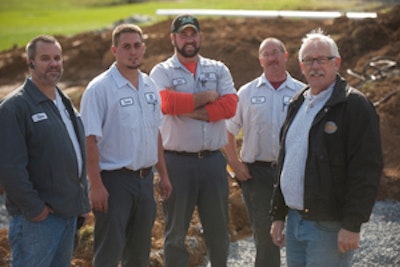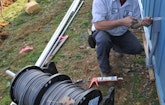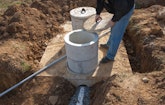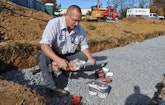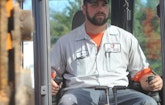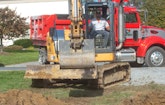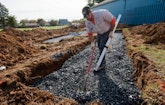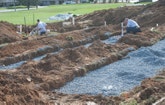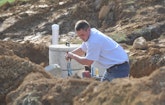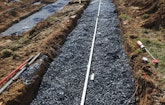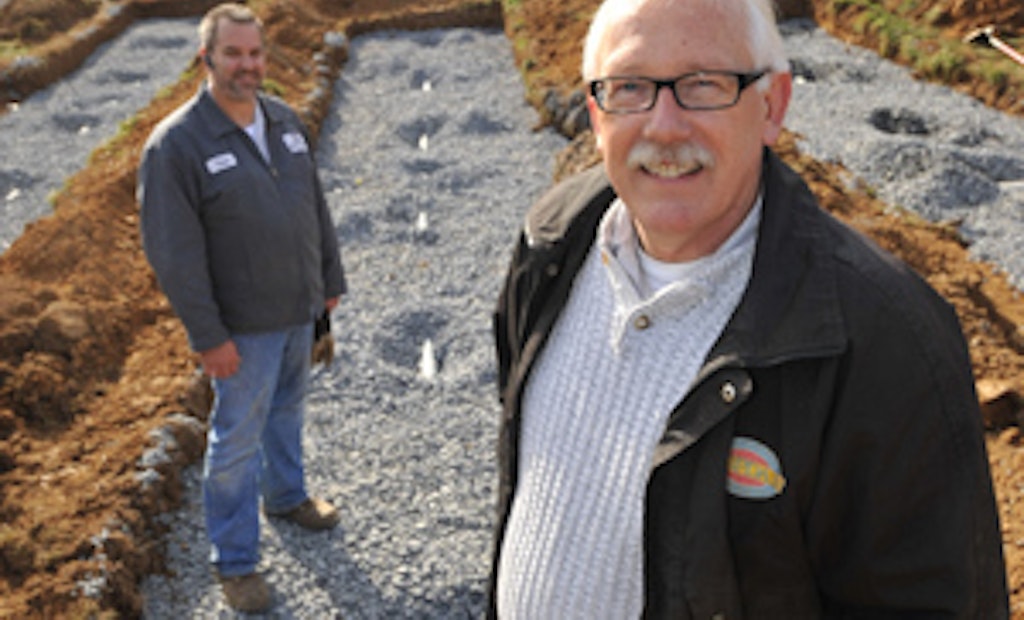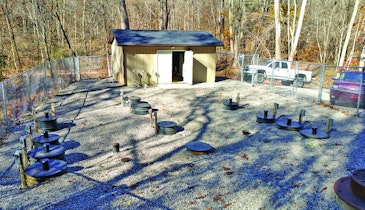Interested in Pumps?
Get Pumps articles, news and videos right in your inbox! Sign up now.
Pumps + Get AlertsReferrals from satisfied customers bring a continual flow of business to Christman’s Septic Service, even in a down economy.
“We solve people’s problems, and we refuse to fix problems somebody else has diagnosed,” says Gary Christman, co-owner. Successful solutions start with careful problem analysis and build from there to complete customer satisfaction.
“I will not put our reputation at risk by relying on an investigation we did not perform,” Christman says. “If we did not do the investigation, we cannot be certain the solution proposed is the right one. Our interest is in repairing and returning existing systems to full performance. If that is not possible, we recommend a completely new system matched to the site’s conditions, regardless of the challenges we encounter.”
The company’s crews have installed countless complete systems but have never installed the first system on a property to serve new construction. Located in Fogelsville, Pa., on the western edge of the Lehigh Valley about 60 miles northwest of Philadelphia, Christman’s Septic works on projects within a 25-mile radius.
The business includes about half system replacements, repairs and inspections, and about half pumping of residential and commercial systems, including holding tanks and grease traps.
Finding opportunity
The valley is within 90 minutes of New York City and has seen continued growth despite the national slow-down in home construction. “We find there is plenty of work in our niche in this area,” Christman says. “People either choose not to move and instead fix their problem systems, or buyers negotiate system repairs as a condition of a sale.”
Operations manager Dave Hummel observes, “If it can be repaired, no matter how basic or complex the repair, it falls in our niche. We have no allegiance to any particular technology or system design. If a design or technology meets the site’s needs, we will propose it to the owner. Often the owner has the opportunity to review and choose from more than one option.”
This open-to-all approach requires an investment in employee training that the company makes willingly. It also takes a willingness to learn new technologies approved by the state Department of Environmental Protection (DEP).
Hummel’s son, Josh, a state-certified sewage enforcement officer (SEO), performs soil evaluations, conducts percolation tests and designs complete systems. This lets the company handle entire projects, from diagnosis to seeding, with its own resources.
“The only thing we do not do is issue the permit and inspect the final installation,” says Josh. “Those tasks are exclusively reserved for the municipal SEO.” Josh is qualified to handle all administrative aspects of a project. He has completed all available DEP training and has a working knowledge of all permittable technologies.
In this regard, he may have completed more training than the municipal SEO. Working across an area of nearly 500 square miles, he sees a greater diversity of soils and system types than an SEO serving one municipality. Having the SEO resource in-house gives Christman’s a significant advantage over installers who must hire consultants to review sites.
Christman’s approach starts with a comprehensive inspection of the system, from the building sewer to the absorption area and all components in between. Once they locate all defects, they evaluate each item’s contributions to the problem.
“We do not stop with the first defect we find, assume we have found the entire problem, and propose what could be a limited solution,” Christman says. Everything from the replacement of a 99-cent cleanout cap to a new absorption area requires a permit in Pennsylvania; the difference is the complexity of site evaluation and the design of the remedy. In-house, Christman has developed a fully qualified team to deploy to suit any situation.
He observes, “We have a good team. We like problem-solving challenges. We get a sense of accomplishment when we resolve the issues.”
Rule nothing out
Christman and Hummel approach every trouble call with an open mind. “We never know what we will encounter,” Christman says. “To assume the answer before we understand all the site has to tell us would be a disservice to those who call us.”
Like a team of physicians, they gather a complete system history. Without understanding a problem in depth, they can easily misread the symptoms, miss the underlying circumstances and repair the wrong thing.
“We had a call regarding a basement sump pump problem,” Christman recalls. “We only knew the pump ran ceaselessly.” On site, they learned that the pump’s behavior had started more than a year earlier. The homeowner had no idea that the sump was discharging effluent, not groundwater. When someone reported sewage on the road to the local government, the owner called Christman’s.
The key question was: Where is the effluent coming from? “We checked the building sewer, treatment tank and effluent delivery lines,” says Hummel. “All were intact; they were not the source of the effluent.” The property’s history showed that the lot was subdivided from an adjoining mobile home community. They remembered that the effluent from the house was previously directed to an absorption area on the now-separated property.
“We wondered if there could be a connection,” Christman says. A dye-test of the neighbor’s system validated their hypothesis. They excavated the building sewer and confirmed that effluent was moving from the other property through the void space in the pipe bedding aggregate. “This flow passed our owner’s treatment tank, finding its way through the soil under the house, and eventually reaching the basement sump,” Christman recalls.
Making the fix
The repairs were straightforward. “Before replacing the building sewer, we removed all of the bedding aggregate, replacing it with heavy clay below and around a new building sewer,” says Hummel. “Solving the inflow problem solved the pump overrun issue.”
The mobile home park’s system was found to be in failure, leading the owner to install a new system using aerobic treatment units discharging to two elevated sand mounds. The original customer’s system was also found to be in failure, and the Christman’s team designed a new one that the DEP categorized as experimental. Permit conditions required both owners to enter management service contracts.
“It was over a year before the two properties’ systems were permitted and operational,” Hummel recalls. “One of the biggest challenges was convincing the municipal regulator that we had found the source of the sump discharges and that it came from the neighbor’s property.”
Embracing technology
Whether making repairs or installing new systems, Christman’s employees know an impressive list of onsite technologies, from Ecoflo (Premier Tech Aqua), Infiltrator Systems, Orenco Systems, American Manufacturing, Polylok, Goulds Water Technology, Liberty Pumps, SoilAir, and others.
The company uses products from Monarch Precast Concrete and Reading Precast, two local tank manufacturers. Christman has found ways to identify and deploy business-boosting technologies first developed for other endeavors.
For many years the company’s purpose-built database worked extremely well and enabled high-level data analysis, but it had its limitations. The company is now transitioning to a cloud-based database application. Part of the transition includes introduction of the Intuit Field Service Management System.
“This enables every employee to capture customers’ payments in the field at the time of service,” Christman says. “Each employee carries a smartphone, the customer provides the credit card, and the payment is posted before our person leaves the service location.”
Field payment processing is linked to the QuickBooks accounting package. Payments are always posted to the correct account. The system can be expanded to print receipts on the spot. Employees’ smartphones have GPS locator signals that let the office know their locations in real time. The system also plots job sites on the same display map. This is a great tool for deciding which asset to send to what emergency call.
Other system capabilities include job planning, work-in-progress reports, and payment status. “This is a great tool that gives Dave and me situational awareness at all times,” Christman says. While he is a frequent Facebook and SmugMug participant, he generally reserves those portals for social exploration.
Christman has built the business on employees’ strengths. “Josh Hummel has a strong electrical background which makes him more valuable,” he says. Dave Hummel adds, “He brings diversity and depth to our capabilities, allowing us to go after projects we might otherwise have avoided or for which we may have needed to subcontract portions of the work.”
Another advantage Josh brings to the job site is his ability to speak on equal terms with municipal SEOs. “An installer who is not an SEO is at a disadvantage in these conversations,” Christman believes.
Pre-sale inspections
Key employees have completed a training program that prepares them for the inspection of existing onsite systems. “Typically, we get called in to do a second-opinion inspection when the initial report identifies problems,” Dave Hummel says. Problem-identification begins with a comprehensive evaluation that serves two purposes.
The customer receives an unbiased second opinion, and the company gathers enough information to understand the system and propose the right array of solutions. In essence, the company is paid for troubleshooting.
In many market areas, most system inspections are done by home inspectors rather than by onsite system professionals. “It is common for us to read the initial report, compare it to ours and wonder if both reports relate to the same property and system,” says Josh Hummel.
The Christman’s Septic Service website displays links to several industry associations. “Showing potential customers the groups we are affiliated with builds our credibility in the industry,” Christman says. “By visiting those sites, customers can learn about onsite systems and see that our company is on top of industry trends.”
The connections legitimize Christman and what he tells customers. The links also convey a subtle advertising message: We are known by the company we keep. “One link represents accolades delivered by customers and bestowed upon all of our employees,” says Christman.
The Allentown Morning Call, the local newspaper, sponsors an annual business recognition program called the Readers’ Choice Awards. The company received that award in 2005. “This was the last year septic system maintenance was included in the contest, so that makes us the reigning champ,” Christman says.
Maintenance side
While specializing in repairs, Christman’s does not routinely offer system management programs at present. “We will provide it on request, but we are not marketing it,” Christman says. He likes the idea that management services keep the company name in customers’ minds.
Management goes hand in hand with pumping, and soon Christman expects a focused expansion in that direction. He got started in the waste industry driving an uncle’s trash truck during the year he took off from college to make some money.
By 1985, he owned a vacuum truck and was successfully pumping tanks. It was not until he and his brother Phil created a partnership that he was able to take a vacation. The company today has 10 employees working in three counties.
Dave Hummel, as operations manager, keeps the work flowing by deploying assets to the best advantage. Josh Hummel handles site and system evaluations, system designs, and electrical specialty work. His brother Luke is the head service technician.
David Makovsky, an assistant service technician, helps Travis Turney, operator/installer, on installation sites. Tabitha Malinowski, administrative assistant, ensures an orderly workflow. She sees that vacuum truck operators Willard Krum, Dennis Klechner and Richard Smith are on time servicing tanks on a schedule convenient to customers. For commercial customers, this may mean servicing them late in the evening or early in the morning so that the vacuum truck is not an obstacle to customer traffic.
The company’s equipment is well suited to address any field condition. Five manufacturers are represented in excavating equipment alone: John Deere, Case, ASV (Terex), Terramite and Komatsu. Only the Deere Extendahoe is more than four years old.
Chevy, Ford and Peterbilt nameplates are on the eight service and dump trucks that can pull any of four trailers in capacities from 3,000 to 40,000 pounds.
Christman’s Septic Service has built a reputation that causes prospective customers to seek the company out. “We are usually not the first company to be called,” says Christman. “We are not the cheapest, but when others give up, they are happy to have us to call on. This is a compliment, and we appreciate their confidence.”
